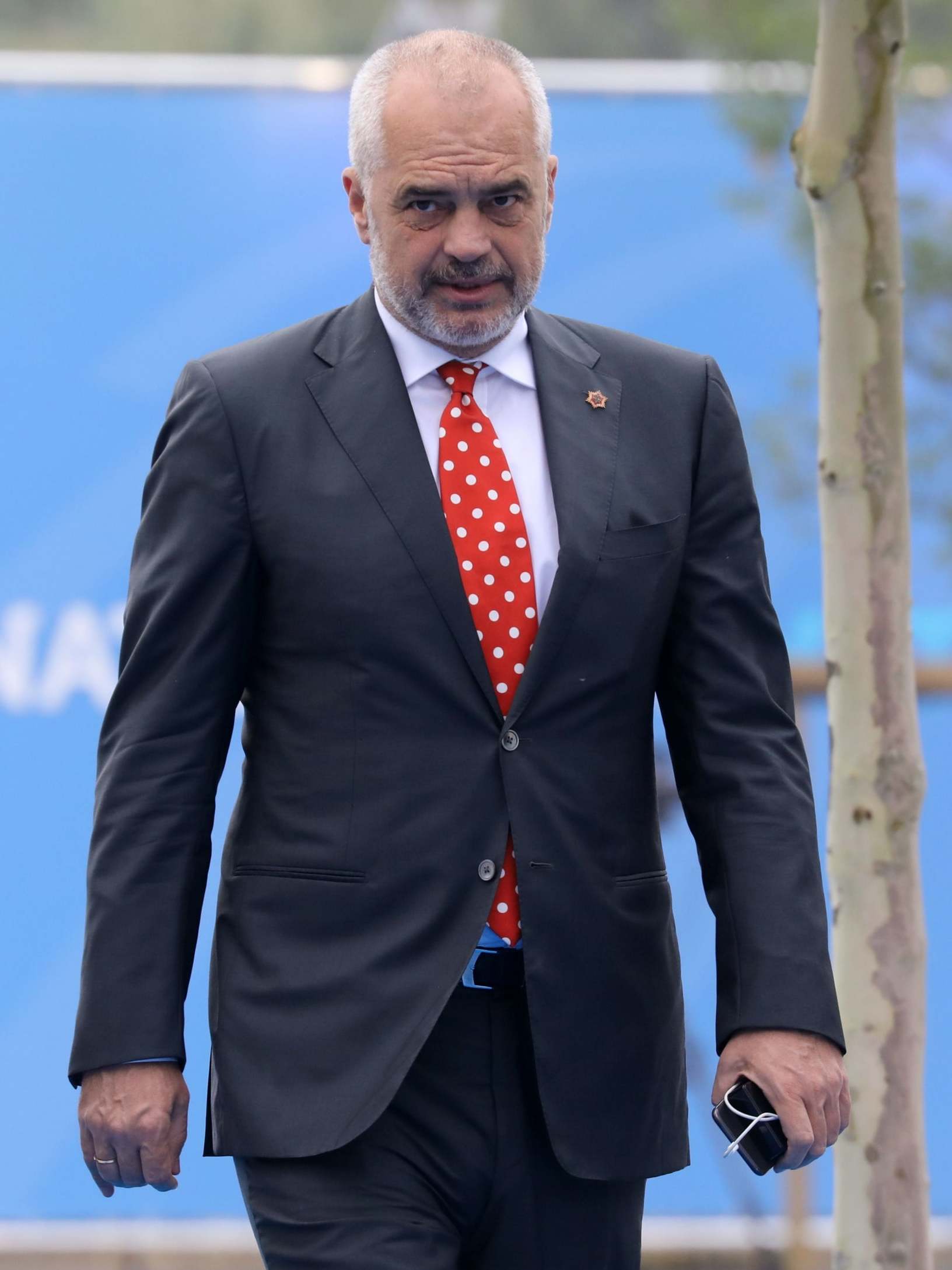First they came for the morning show: How Albania’s government shut down an entire TV station that dared to criticise it
Albania shut down one of Europe’s most promising media experiments. Now the government has been ordered to cough up €140m in damages
Your support helps us to tell the story
From reproductive rights to climate change to Big Tech, The Independent is on the ground when the story is developing. Whether it's investigating the financials of Elon Musk's pro-Trump PAC or producing our latest documentary, 'The A Word', which shines a light on the American women fighting for reproductive rights, we know how important it is to parse out the facts from the messaging.
At such a critical moment in US history, we need reporters on the ground. Your donation allows us to keep sending journalists to speak to both sides of the story.
The Independent is trusted by Americans across the entire political spectrum. And unlike many other quality news outlets, we choose not to lock Americans out of our reporting and analysis with paywalls. We believe quality journalism should be available to everyone, paid for by those who can afford it.
Your support makes all the difference.On air for her regular morning news show, Sonila Meco was forced to begin narrating for the audience what was unfolding before her – government agents swarming the station, knocking over equipment in their search through files.
They claimed they were from Albania’s state-owned energy company and wanted to talk with the managers of the station. Agon – or Dawn – TV began broadcasting live as the officials stormed in, while Meco watched the surreal development.
“This is a dark day for journalism in Albania,” she declared in the stunning broadcast.
Authorities in the Balkan state of Albania had warned the station – and its high-profile Italian owner Francesco Becchetti – for months that they were gunning for the television channel.
Its free-wheeling coverage was angering the tiny Balkan state’s political elite, which are accused of corruption and being in the pocket of the country’s powerful drug traffickers.
There was a new boss in charge in Tirana, capital of Albania. Edi Rama, a political powerhouse and former mayor of the capital, had become prime minister in a surprise 2013 election victory.
A report by a delegation of media advocacy groups this year in Albania found press freedom under Rama deteriorating, citing physical attacks on journalists, top officials smearing critical media, and sycophants being rewarded with access.

Agon TV, launched in 2013 with ambitions of turning tiny Albania into a European media hub, was uncompromising in its coverage from the off, and in 2015 began airing reports alleging fraud in local elections, including a report about the same man voting 20 times with different identification cards.
The reports caused a stir. But few anticipated what would come next.
“I was talking about all the [agents] that were in the station,” Meco recalled in an interview with The Independent, describing the 10 October 2015 incident.
Then everything went black. “I want to say that at this moment the electricity to our channel has been cut,” she announced.
In the ensuing days, authorities seized the station’s equipment and almost all of its archives.
In one swoop, Albania, a western Balkan Nato member closely allied with the US, killed off for good one of the most promising media experiments in the Balkans, perhaps even in all of Europe.
“The investment was €150m,” Becchetti tells The Independent. “They took everything.”
Earlier this year – in a development that offered Becchetti, his partners and former staff some measure of vindication – an arbitration tribunal ordered Albania to pay the owners of Agon €99.5m in damages for the station and other investments in the energy sector, and cough up €8.8m euros in legal fees for effectively expropriating the station. In addition, Albanian partners to the station were indirectly awarded roughly €30m.
The decision also required that Albania pay interest on any money owed.
The case illustrates how a group of authoritarians in eastern and southeastern Europe is attempting to squelch press freedoms, often abusing legal tools. EU officials are beginning to take notice, voicing concern this week after Albania proposed a law to tighten controls on online media.
“While we share the Albanian authorities’ concerns with regard to disinformation, the [European] Commission recommends approaches that are less severe, based on a self-regulation approach,” EU ambassador Luigi Soreca cautioned this week.
The Albanian government contends that seizing the station was a legitimate use of executive and police powers in accord with Albanian law. The Independent sought comment from Albanian officials and the law firms that represented the country in the arbitration matter, but received no substantive reply by publication. One UK law firm representing Albania said its barristers were “all just too thinly spread with client work” to comment.
Of the tens of millions of euros Albania was ordered to pay, it has so far yet to pay a penny.

It was with high hopes that Becchetti and his business partners entered the country as investors in the hydro-electric industry during the 1990s as it emerged from one of the most repressive communist dictatorships in Europe. He first launched the free daily newspaper AgonFree in 2006, applying to open a satellite TV station in 2013.
The station expanded rapidly, launching 24-hour broadcasts the next year, and starting an Italian-language sister channel in 2015.
“We were fiercely independent and unafraid of criticising the ruling parties,” says Becchetti, best known in the UK as owner of the football club Leyton Orient for several unhappy years – the club was relegated and racked up over £5m in debts during his tenure.
Becchetti hoped to build on his investment in Albania, using low production costs to launch Italian broadcasts and perhaps eventually English and other language channels.
Journalists like Meco who worked at the channel describe it as a haven for professionals. It used up-to-date HD quality broadcast technology. Some 500 employees were housed in an office just outside the centre of Tirana.
The station employed top-notch editors and producers, paying salaries three or four times what other Albanian journalists were making.
“I understood this as an example of globalised European television,” says Becchetti. “Then we [would] go to France, Germany, the UK. That was our goal.”

But troubles between Rama’s government and the station began immediately. In one incident, Erion Veliaj – a Rama ally who is now mayor of Tirana – was upset that Agon covered his fancy September 2014 wedding.
“I don’t understand why are you doing this to me,” he wrote in a letter. “You are forcing me to be your enemy! The entire government is going to be [Becchetti’s] enemy for no reason.”
The battle between the station and the government escalated, perhaps exacerbated by tensions between Albania and Becchetti over his energy sector investments.
Agon reported what it described as widespread allegations of electoral fraud in 2015 municipal elections that saw victories for Rama and his party.
Meanwhile, Albanian prosecutors formally charged Becchetti and his partner Mauro De Renzis with forgery, money laundering and tax evasion, and launched legal manoeuvres to take control of Agon.
Rama railed against the channel in television interviews, describing it as a “scandalous phenomenon against which we have declared war”, and accusing it of being funded by “dirty money”.
Agon continued to broadcast, though its employees couldn’t get paid. Attempts to wire them money from Italy were blocked by Albanian banks. The government upped the pressure: Agon’s journalists, editors, analysts, cameramen and even hair stylists were stopped at Albania’s borders and forbidden to travel abroad.
Court orders were drawn up to seize the channel, but few believed a government aspiring to join the European Union would take so drastic a move.

“I was shocked,” says Meco, now 42 and still working as a journalist in Albania. She still hasn’t gotten over the government-backed seizure of Agon. “I didn’t think things would come to this end.”
For three years Meco struggled to find work as a journalist, before eventually landing a job at another channel. But she continues to long for the stature and resources of Agon.
“It was a channel where as a journalist you could exercise liberty and freedom of information,” she says. “This is very important not only for me, but Albania also had this great opportunity to be represented in the world with such a project. Everything after is like being downgraded. Nothing is like what we had.”
The arbitration panel found the accusations of money laundering and tax evasion against Becchetti unfounded.
He suspects the Albanian campaign against him was rooted in his energy dealings as well as the content of Agon TV, with powerful competitors in Italy and Albania egging on Rama.

Western governments have repeatedly refused to honour Interpol red notices that Albania issued against Becchetti and his partners, and Albania has quietly withdrawn the requests.
Rama, asked earlier this year about the case, refused to disclose details about the case or comment on the ruling, citing a confidentiality agreement. The case has cost the impoverished country millions of euros in legal fees.
Becchetti now spends much of his time overseeing his various legal battles with Albania, but is also attempting to start an investment fund for entrepreneurs pursuing international ventures. He says he is also writing a screenplay about his Albania misadventures.
The battle for Agon TV has cost him four years of his life, but he says the real loss is what Albania could have become.
Since shutting down Agon, Albania has increased attempts to impose restrictions and pressure on the press. Since last year, it has fallen from 75th to 82nd in the Reporters Sans Frontier ranking of countries’ media freedom.
Rama is said to repeatedly refer to Albanian journalists as “trash bins” – though he promised a group of international media freedom advocates he met in Tirana in June that he would refrain from continuing to use the smear.
Over the summer, Adi Krasta and Ylli Rakipi – both journalists who are critical of Rama and his protege Veliaj – were fired from talk shows on the Albanian News24 TV channel, under alleged government pressure.
“After the fall of the communist regime, Albania started to build up its democracy from scratch – and thanks to the hard work of the Albanian people, aided by international investors like myself, the country broke through the inertia of its past and had made great strides forward,” says Becchetti.
“But the Rama government then put in place a series of actions against the freedom of people, including the closure of Agon channel and the attempt to arrest me, which was a huge step backwards.”
Subscribe to Independent Premium to bookmark this article
Want to bookmark your favourite articles and stories to read or reference later? Start your Independent Premium subscription today.

Join our commenting forum
Join thought-provoking conversations, follow other Independent readers and see their replies
Comments